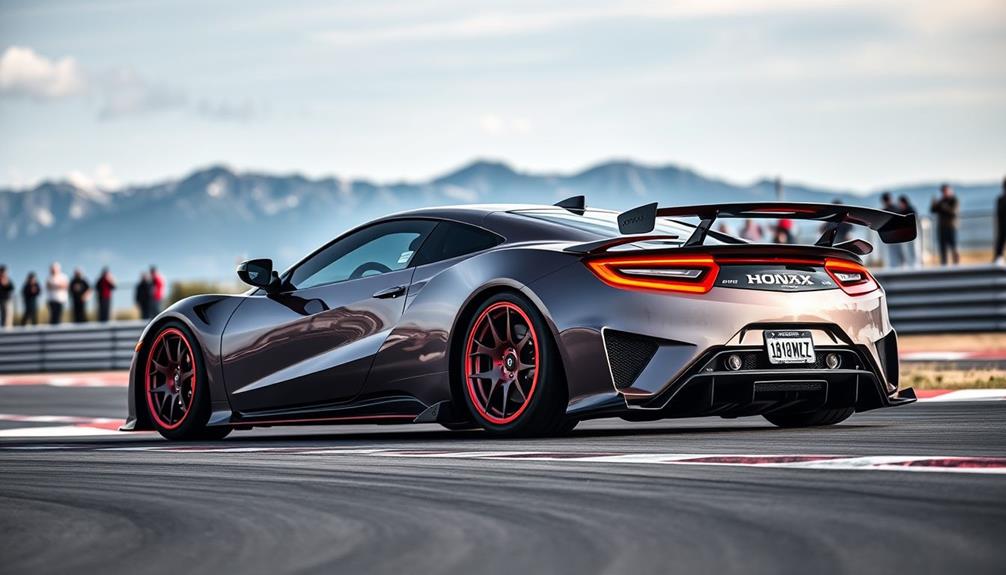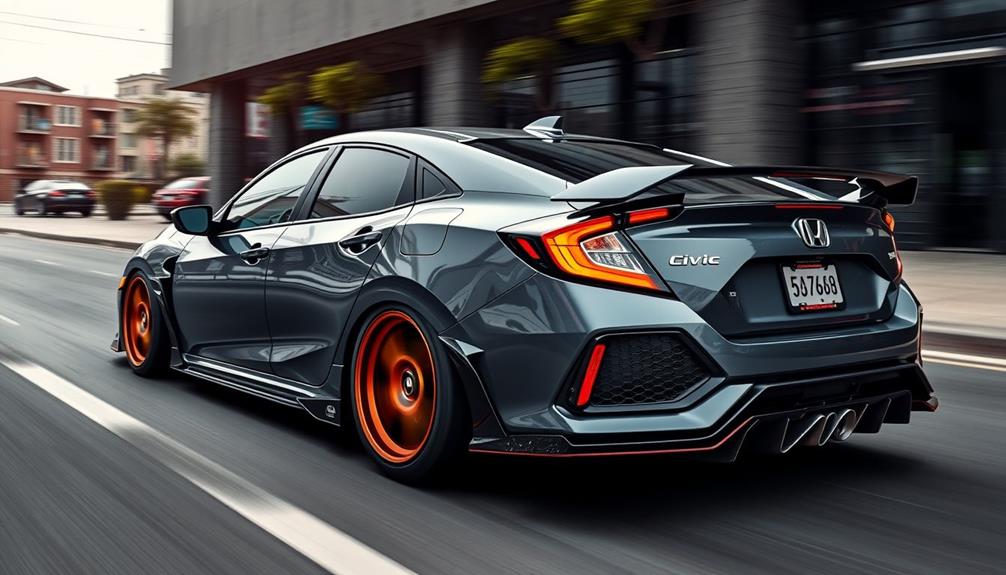Tuning your 1997 Honda Civic can turn it into a powerhouse. Start by considering engine swaps like the B-series engines for significant power boosts. Adding forced induction with a turbocharger can increase horsepower by over 50%. Don't forget about weight reduction; removing non-essential parts can enhance acceleration. Make sure your engine's in great condition with regular maintenance and performance tests. Budget carefully, as upgrades can range from hundreds to thousands of dollars. Finally, connect with fellow enthusiasts in online forums to stay updated on tips. Full potential awaits those who look deeper into tuning strategies and community resources.
Key Takeaways
- Consider engine swaps like B-series or H22 for substantial horsepower and torque improvements in your Civic.
- Invest in forced induction systems, such as turbochargers, for power gains exceeding 50% over naturally aspirated setups.
- Implement weight reduction techniques by removing non-essential interior parts and upgrading to lightweight body panels.
- Regularly maintain your engine with oil changes and timing belt replacements to ensure reliability during performance upgrades.
- Utilize tuning tools like Hondata FlashPro to optimize engine management and maximize the performance of your modifications.
Engine Conversion Options
When it comes to engine conversion options for your '97 Honda Civic, you've got a range of powerful choices at your fingertips. One of the most popular upgrades involves swapping your existing engine for a B-series engine, like the B16 from the Civic Si or the B18 from the Integra. These engines are known for their significant boosts in horsepower and torque, making them an excellent choice for performance enthusiasts.
Additionally, conducting thorough keyword research can help you identify the best modifications that appeal to fellow enthusiasts in the community.
If you're working with a D-series engine, you can also achieve VTEC functionality by replacing the cylinder head with a compatible VTEC head. This method offers a cost-effective way to enhance performance without the full engine swap.
However, if you're feeling adventurous, consider the H22 engine from the Prelude. Keep in mind that this swap may require additional modifications due to space constraints in your Civic's engine bay.
No matter which route you choose, extensive research and instructions are readily available on automotive forums. These resources can guide you through your engine upgrade project, ensuring you achieve the performance you desire while managing the complexities of engine conversions.
Performance Upgrade Strategies

When it comes to boosting your Honda Civic's performance, consider engine swaps for a serious horsepower upgrade.
Additionally, understanding the importance of a proper budget for your tuning projects can help you allocate funds efficiently.
You might also explore forced induction options for even more power, but keep in mind the necessary tuning and maintenance.
Engine Swap Options
If you're looking to boost your Honda Civic '97's performance, engine swaps offer some of the most effective upgrade strategies. The most popular engine swap options include the B16 or B18 series engines from the Civic Si and Integra, which deliver significant performance gains over the stock D-series engine. The H22 engine from the Prelude is another powerful option, but it might present space limitations in your engine bay.
Before diving into an engine swap, consider the following options:
| Engine Type | Performance Gain |
|---|---|
| B16 Engine | High-revving, responsive |
| B18 Engine | Strong torque delivery |
| H22 Engine | Powerful, but tight fit |
| Mini-Me Swap | Cost-effective gains |
A complete swap typically requires professional installation, with costs potentially exceeding $3,000 for labor and parts. Always perform compression and leak-down tests on the new engine to verify it's in good condition and avoid future issues. If you want noticeable improvements without breaking the bank, the mini-me swap can be a cost-effective alternative while still edging you closer to maximum power.
Forced Induction Benefits
Forced induction systems, like turbochargers and superchargers, dramatically enhance your Honda Civic '97's performance by delivering impressive horsepower and torque gains—often exceeding 50% compared to naturally aspirated engines.
By installing a quality turbo kit, you can release the true potential of your classic hatchback, transforming it into a formidable performer on the road. Additionally, it's important to evaluate risk management strategies to guarantee your investment yields the best results.
While the initial investment for a forced induction system typically ranges from $2,000 to $5,000 for DIY installations, the gains are well worth it.
Just remember that professional installation could add another $1,000 to $2,000, but proper tuning afterward is vital. This guarantees your engine runs efficiently, optimizing fueling and ignition for the best performance.
Keep in mind that turbo lag can be an issue, but by choosing the right turbo size and configuration, you can minimize this effect and enhance throttle response.
Additionally, supporting modifications like upgraded fuel delivery systems and enhanced cooling components are fundamental for maintaining reliability and performance.
Embrace forced induction, and your Honda Civic '97 won't only be more powerful but also more enjoyable to drive.
Weight Reduction Techniques
Boosting performance in your Honda Civic '97 isn't just about adding power; weight reduction plays a significant role too. Start by removing non-essential interior components like rear seats, sound deadening materials, and the spare tire. You could shed up to 100 lbs or more, making a noticeable difference in acceleration and handling.
Additionally, embracing primitive weapons for modern survival can inspire creative solutions for weight reduction by utilizing materials you might already have.
Next, consider replacing stock body panels with lightweight materials such as fiberglass or carbon fiber. This upgrade not only decreases overall vehicle weight but also enhances your car's performance and handling.
Additionally, upgrading to lightweight racing wheels can save you 10-15 lbs per wheel, improving both acceleration and braking response.
Don't overlook the battery—install a lightweight option or relocate it to a central position for better weight distribution and handling characteristics.
Finally, swap out your stock seats for stripped-down racing seats, which can save around 20-30 lbs each. This change not only contributes to weight reduction but also provides better driver support during spirited driving.
Engine Condition Assessment
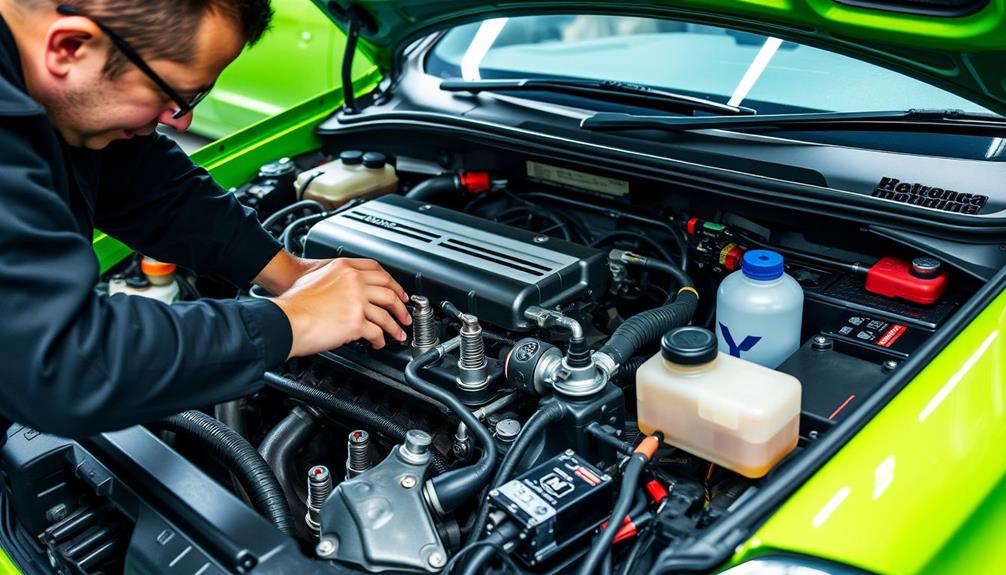
To ascertain your Honda Civic's engine is ready for tuning, conducting a thorough engine condition assessment is essential. This process helps you identify potential issues that could affect performance before you plunge into modifications.
Start by focusing on these key areas:
- Compression Test: Perform a compression test on your D16Y8 engine. You should aim for results between 180-210 psi. Lower numbers may indicate worn piston rings or cylinder walls. Confirming your engine runs smoothly is akin to air purifier maintenance dos and don'ts, which emphasizes the importance of regular checks.
- Leak-Down Test: This test helps pinpoint specific areas of air leakage, revealing internal health concerns that mightn't show up in a compression test.
- Regular Maintenance: Keep up with oil changes and timing belt replacements. Regular maintenance guarantees your engine stays in good condition, supporting the longevity of any performance upgrades.
- Engine Block Preparation: If you're making significant modifications, consider thorough cleaning, milling, and truing of the engine block to achieve peak performance levels.
Budgeting for Upgrades

Establishing a budget for your Honda Civic upgrades is essential before diving into performance modifications. Costs can vary greatly, ranging from a few hundred to several thousand dollars, depending on the complexity of the parts you choose.
To make informed decisions, consider reviewing trusted precious metal IRA options as you'd evaluate performance parts. Start by determining how much you're willing to spend and break down your budget into categories for parts and potential labor.
If you're handy, consider DIY modifications to save on labor costs. However, honestly assess your skill level, as some installations require specialized knowledge and tools. For example, an exhaust upgrade might cost between $250 to $500 for parts alone, with professional installation adding another $200 to $400.
Prioritize the upgrades based on your performance goals and budget constraints. Remember, more advanced modifications like forced induction can set you back up to $5,000, while simpler bolt-on options are generally more affordable.
Additionally, don't forget to budget for regular maintenance and inspections before making upgrades; ensuring your engine is in top shape can prevent unexpected costs and help your modifications deliver the performance improvements you desire.
With careful budgeting, you can maximize your Civic's potential without breaking the bank.
Installation and Labor Insights

While planning your Honda Civic upgrades, understanding the installation process and labor implications is essential. Noteworthy modifications, especially those involving the engine, often require engine removal, which can take several hours based on your DIY skills.
Additionally, if you're pondering new appliances for your garage or workshop, it's wise to explore appliance maintenance plans to keep your tools in top shape. If you opt for professional help, be prepared for added fees that can greatly increase your overall costs.
Here are some key points to ponder:
- Engine Removal: Necessary for major upgrades like block milling, this can be time-consuming and complex.
- Labor Costs: Professional installation of performance parts can exceed $3,000, depending on the modifications' complexity.
- Short-Shift Installation: These upgrades require skilled technicians for proper installation to enhance driving responsiveness.
- Budgeting: Always factor in both parts and labor, as total costs can easily surpass $868 based on local rates.
Tuning Overview and Paths

Tuning your Honda Civic 97 opens up a world of possibilities to boost performance and tailor your ride to your preferences. You can explore various tuning paths, each offering distinct advantages depending on your budget and expertise.
| Tuning Path | Key Features |
|---|---|
| Forced Induction | Turbocharging or supercharging for max power, costs $2,000 – $5,000 |
| Naturally Aspirated | Cost-effective upgrades like cold air intake and exhaust systems |
| Engine Management | Tools like Hondata FlashPro for optimized tuning |
| Performance Goals | Set realistic horsepower targets based on stock D16Y8 limitations |
| Community Support | Engage with fellow enthusiasts for insights and tips |
If you're a beginner, naturally aspirated options are ideal. Upgrades like a cold air intake can enhance airflow, improving efficiency and power without breaking the bank. However, if you're after substantial horsepower gains, consider the forced induction route. Just remember, significant increases may require a complete engine swap. Always engage with the community—shared experiences can guide you through the complexities of tuning your Civic, helping you make the most informed decisions for your tuning journey.
Recommended Parts for Upgrades

When you're ready to enhance your Honda Civic 97, choosing the right parts can make all the difference in performance. A well-tuned vehicle not only improves driving enjoyment but can also contribute to better fuel efficiency and reliability.
Here are some recommended upgrades that can greatly boost your ride's horsepower and efficiency:
1. Cold Air Intake: This upgrade improves airflow and can add approximately 5 to 15 HP, making it a cost-effective option for your Civic.
effective relief from engine strain is essential.
2. High-Flow Cat-Back Exhaust System: Not only does this enhance exhaust flow, but it also gives your engine a more aggressive sound while delivering noticeable performance gains.
3. Performance Headers: These are essential for improving exhaust efficiency, allowing for better power output, especially when combined with other modifications.
4. Turbocharger Kit: If you're seeking substantial power increases, a turbo kit is one of the top choices, though it can cost between $2,000 to $5,000, depending on the components and labor involved.
Additionally, don't forget about upgrading your ignition components, like spark plugs and coils, to maximize performance, particularly when using forced induction systems.
These parts can truly transform your classic hatchback into a powerhouse.
Community Resources and Support
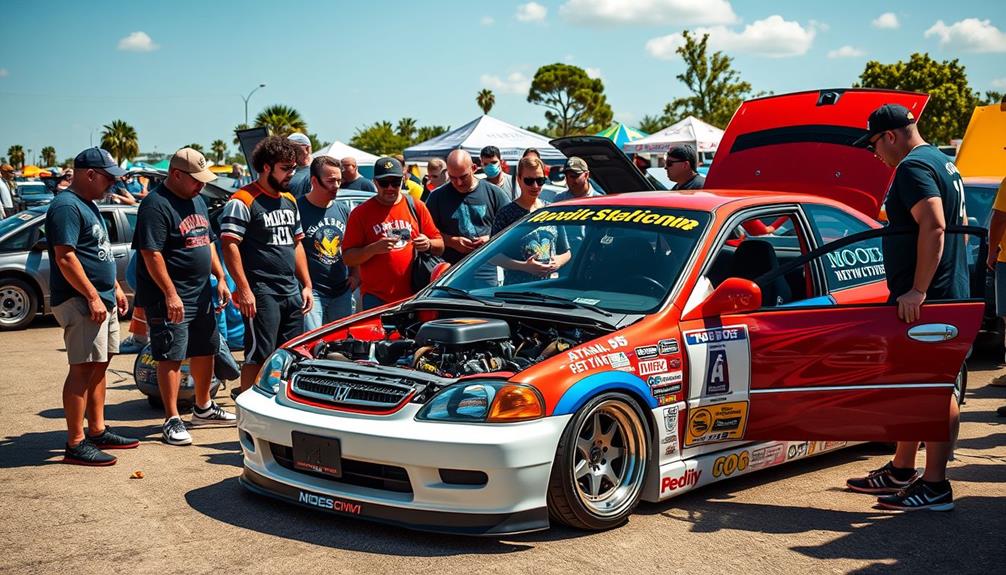
Joining online forums and local clubs can be a game-changer for your Honda Civic 97 tuning journey.
You'll find a wealth of knowledge sharing tips, DIY guides, and personal experiences that can help you avoid common mistakes. Engaging with fellow enthusiasts can also lead to discovering healthy dog snacks that keep your pets happy while you work on your car.
Plus, attending meetups lets you connect with fellow enthusiasts who can recommend trusted services and parts suppliers.
Online Forums and Communities
Online forums dedicated to Honda tuning are a treasure trove for enthusiasts looking to enhance their Civic 97. Engaging with these communities not only helps you learn about performance upgrades but also connects you with others who share your passion for the Civic Si.
Additionally, you can find valuable insights into hamster care costs that can be surprisingly beneficial for managing your budget when considering vehicle maintenance.
Here are some benefits of joining these online spaces:
- Experience Sharing: Tap into the collective wisdom of fellow Civic owners who've faced similar challenges.
- DIY Resources: Find a plethora of tutorials and videos that simplify complex modifications, allowing you to tackle projects with confidence.
- Networking Opportunities: Discover affordable service options and parts deals while connecting with local enthusiasts for hands-on learning.
- Supportive Community: Participate in discussions to gain insights into common tuning pitfalls, helping you avoid mistakes and achieve better results.
Knowledge Sharing and Tips
Tapping into the wealth of knowledge within the Honda Civic tuning community can greatly enhance your experience as a Civic 97 owner. Engaging with automotive forums and communities offers you valuable insights and practical advice on effective tuning strategies.
These platforms often feature dedicated sections for DIY guides, where experienced enthusiasts share step-by-step instructions for popular modifications and upgrades. By leveraging these resources, you can save time and money on your tuning journey.
Participating in online discussions and local car meets allows you to connect with fellow Civic owners. This interaction helps you exchange tips on parts, troubleshoot performance issues, and discover new tuning methods.
Social media platforms also play an essential role in keeping you updated on the latest trends and innovations in tuning. Plus, you might even find discounts on parts from manufacturers.
Online resources provide access to detailed performance tuning guides and video tutorials, making complex modifications easier to grasp.
Whether you're a beginner or an experienced tuner, these community-driven resources can guide you in maximizing your Civic's potential and ensuring your hatchback stands out on the road.
Local Meetups and Events
Local meetups and events are a fantastic way to immerse yourself in the Honda Civic tuning culture. Engaging with fellow enthusiasts not only enhances your knowledge but also fosters lasting friendships.
Here are some key benefits of participating in these gatherings:
- Tuning Workshops: At local meetups, you can learn from experienced members about performance upgrades and tuning strategies that can maximize your Civic's power.
- Track Days: Many automotive communities organize events where you can test your modified Civic in a controlled environment, providing a safe space for competition and camaraderie.
- Networking Opportunities: Social media platforms and online forums often announce local car shows and meets, allowing you to showcase your modifications and connect with like-minded individuals.
- Group Buys: Local clubs frequently host group buys for performance parts, making it easier and more cost-effective to acquire the upgrades you want for your Civic.
Realistic Performance Expectations
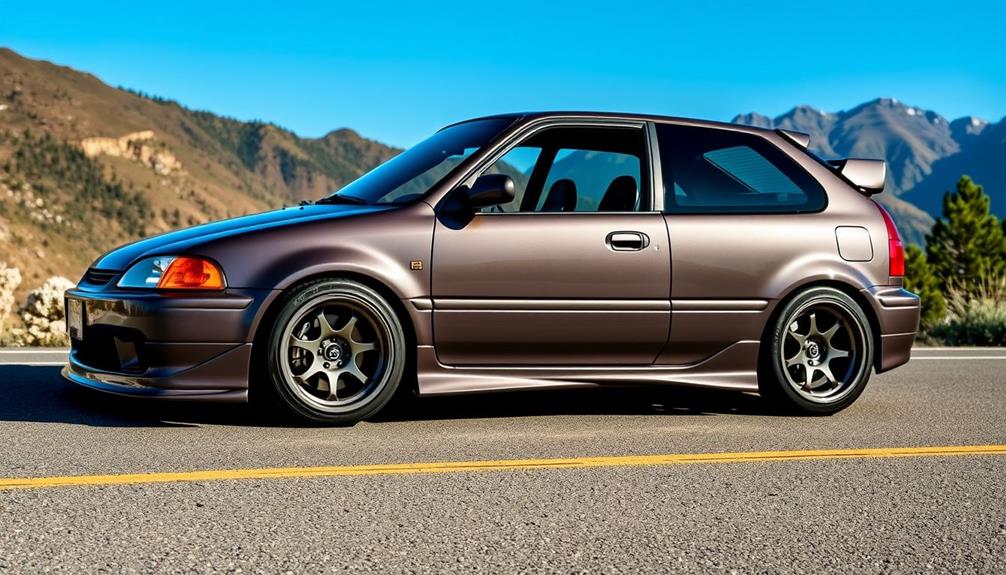
When it comes to tuning your Honda Civic 97, setting realistic performance expectations is vital for a satisfying experience. You should know that basic modifications typically yield only 5 to 15 additional horsepower. If you're aiming for significant gains, consider engine swaps or forced induction. Relying solely on tuning for competitive acceleration might lead to disappointment.
Instead, focus on a combination of engine modifications, weight reduction, and transmission upgrades. Understand that the stock engine and drivetrain have limitations. To achieve high performance in the D class, you might need to explore options outside that category for better results. Incremental upgrades and continuous tuning are essential to aligning your performance aspirations with your budget.
Remember, substantial power increases often require long-term investment. Engaging with automotive communities can also provide valuable insights. By sharing experiences, you'll gain a clearer understanding of what's realistically achievable, helping you avoid common misconceptions about tuning potentials.
Frequently Asked Questions
How to Make a 1997 Honda Civic Faster?
To make your 1997 Honda Civic faster, consider adding a turbocharger, swapping to a D16Y8 head, upgrading to a manual transmission, and installing a high-flow exhaust system for better performance and acceleration.
How to Make 300 Hp in Honda Civic?
You might think achieving 300 hp is impossible, but it's not! Swap in a powerful engine, add a turbo, upgrade components, and tune your setup. With the right modifications, you'll release impressive performance.
How Much HP Can a Stock Civic Handle?
A stock Civic can typically handle around 130-150 horsepower with performance upgrades. If you're considering turbocharging, you can safely push it to 200-250 horsepower, but stay mindful of engine condition and necessary modifications.
What Year of Honda Civic Is Best for Tuning?
If you're chasing ultimate tuning glory, you'll find the 1992-2000 Honda Civics are your dream come true! The Civic Si and EX models are unbeatable, offering lightweight chassis and a treasure chest of aftermarket parts.
Conclusion
As you immerse yourself in the world of tuning your '97 Honda Civic, remember that every decision counts. With the right upgrades, you can release hidden power and transform your classic hatchback into a true beast on the road. But be prepared: the journey might not always go as planned. Will your budget stretch? Can you handle the labor? Stay focused, stay informed, and before you know it, you'll be tearing up the streets, leaving everyone in awe.




